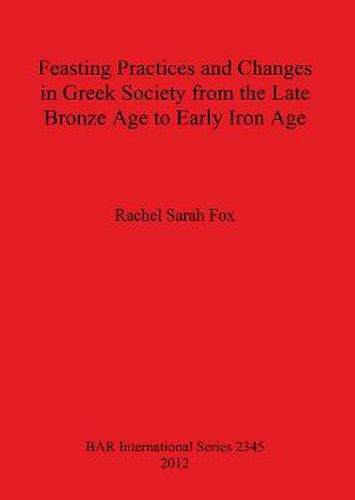Readings Newsletter
Become a Readings Member to make your shopping experience even easier.
Sign in or sign up for free!
You’re not far away from qualifying for FREE standard shipping within Australia
You’ve qualified for FREE standard shipping within Australia
The cart is loading…






This title is printed to order. This book may have been self-published. If so, we cannot guarantee the quality of the content. In the main most books will have gone through the editing process however some may not. We therefore suggest that you be aware of this before ordering this book. If in doubt check either the author or publisher’s details as we are unable to accept any returns unless they are faulty. Please contact us if you have any questions.
A feast is a sensory, sacralised and social occasion. Its multiple resonances and experiences extend far beyond the nutritive consumption of food and drink by a group of people. To understand a feasting event more comprehensively, it is necessary to analyse the whole series of experiences that the original participant would have undergone during the course of a feast, and to trace the footsteps of the diner through each stage of what was presumably a major event in his/her calendar. While the author examines the totality of feasting occasions in this book, her principal focus lies on how feasts serve as an arena for social negotiations: the creation of obligations to a powerful host, the cohesion augmented between companions, the privileging of high-status individuals, the emphasised inferiority of those of lesser status, and the creation of new connections through shared emotive experiences. This work thus explores on a broad scale the multi-faceted use of feasting in mainland Greece by placing it in a diachronic perspective, commencing at the beginning of the Early Mycenaean period (MHIII/LHI) and continuing to the end of the Early Iron Age (EIA). This long-range study is given focus by viewing it specifically from the angle of social changes, developments and negotiations, in order to analyse how socio-political events in Greece throughout the nine centuries under consideration both affected commensal events and were directly or indirectly produced by them.
$9.00 standard shipping within Australia
FREE standard shipping within Australia for orders over $100.00
Express & International shipping calculated at checkout
This title is printed to order. This book may have been self-published. If so, we cannot guarantee the quality of the content. In the main most books will have gone through the editing process however some may not. We therefore suggest that you be aware of this before ordering this book. If in doubt check either the author or publisher’s details as we are unable to accept any returns unless they are faulty. Please contact us if you have any questions.
A feast is a sensory, sacralised and social occasion. Its multiple resonances and experiences extend far beyond the nutritive consumption of food and drink by a group of people. To understand a feasting event more comprehensively, it is necessary to analyse the whole series of experiences that the original participant would have undergone during the course of a feast, and to trace the footsteps of the diner through each stage of what was presumably a major event in his/her calendar. While the author examines the totality of feasting occasions in this book, her principal focus lies on how feasts serve as an arena for social negotiations: the creation of obligations to a powerful host, the cohesion augmented between companions, the privileging of high-status individuals, the emphasised inferiority of those of lesser status, and the creation of new connections through shared emotive experiences. This work thus explores on a broad scale the multi-faceted use of feasting in mainland Greece by placing it in a diachronic perspective, commencing at the beginning of the Early Mycenaean period (MHIII/LHI) and continuing to the end of the Early Iron Age (EIA). This long-range study is given focus by viewing it specifically from the angle of social changes, developments and negotiations, in order to analyse how socio-political events in Greece throughout the nine centuries under consideration both affected commensal events and were directly or indirectly produced by them.